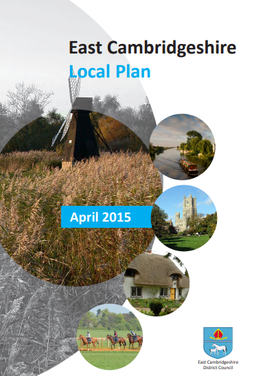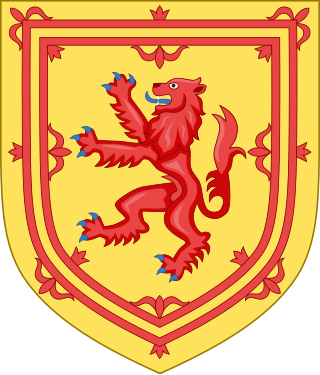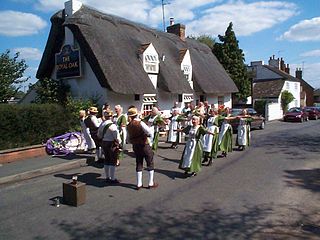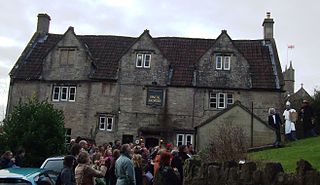Eminent domain, land acquisition, compulsory purchase, resumption, resumption/compulsory acquisition, or expropriation is the power of a state, provincial, or national government to take private property for public use. It does not include the power to take and transfer ownership of private property from one property owner to another private property owner without a valid public purpose. This power can be legislatively delegated by the state to municipalities, government subdivisions, or even to private persons or corporations, when they are authorized by the legislature to exercise the functions of public character.

In the United Kingdom, a listed building is a structure of particular architectural and/or historic interest deserving of special protection. Such buildings are placed on one of the four statutory lists maintained by Historic England in England, Historic Environment Scotland in Scotland, Cadw in Wales, and the Northern Ireland Environment Agency in Northern Ireland. The term has also been used in the Republic of Ireland, where buildings are protected under the Planning and Development Act 2000, although the statutory term in Ireland is "protected structure".
A compulsory purchase order is a legal function in the United Kingdom and Ireland that allows certain bodies to obtain land or property without the consent of the owner. It may be enforced if a proposed development is considered one for public betterment; for example, when building motorways where a landowner does not want to sell. Similarly, if town councils wish to develop a town centre, they may issue compulsory purchase orders. CPOs can also be used to acquire historic buildings in order to preserve them from neglect.

St Andrew's is an association football stadium in the Bordesley district of Birmingham, England. It has been the home ground of Birmingham City Football Club for more than a century. From 2018 to 2021, it was known for sponsorship reasons as St Andrew's Trillion Trophy Stadium.
Town and country planning in the United Kingdom is the part of English land law which concerns land use planning. Its goal is to ensure sustainable economic development and a better environment. Each country of the United Kingdom has its own planning system that is responsible for town and country planning, which outside of England is devolved to the Northern Ireland Assembly, the Scottish Parliament and the Senedd.

The Ontario Heritage Act, first enacted on March 5, 1975, allows municipalities and the provincial government to designate individual properties and districts in the Canadian Province of Ontario, as being of cultural heritage value or interest.

A development plan sets out a local authority's policies and proposals for land use in their area. The term is usually used in the United Kingdom. A Local Plan is one type of development plan. The development plan guides and shapes day-to-day decisions as to whether or not planning permission should be granted, under the system known as development control. In order to ensure that these decisions are rational and consistent, they must be considered against the development plan adopted by the authority, after public consultation and having proper regard for other material factors.

Land reform in Scotland is the ongoing process by which the ownership of land, its distribution and the law which governs it is modified, reformed and modernised by property and regulatory law.

The Northumberland Development Project is a mixed-use development project that centres around the new Tottenham Hotspur Stadium which replaced White Hart Lane as the home ground of Tottenham Hotspur. On opening in April 2019, the stadium had a capacity for 62,062 spectators, later increased to 62,303, and was designed to host football as well as NFL games. The development plans also include 585 new homes, a 180-room hotel, a local community health centre, the Tottenham Experience, a Spurs museum and club shop, an extreme sports facility, as well as the Lilywhite House, which contains a Sainsbury's supermarket, a sixth form college and the club's headquarters.
Planning gains are ways that local authorities in the United Kingdom can secure additional public benefits from developers, during the granting of planning permission.

The Localism Act 2011 is an Act of Parliament that changes the powers of local government in England. The aim of the act is to facilitate the devolution of decision-making powers from central government control to individuals and communities. The measures affected by the Act include an increase in the number of elected mayors, referendums and the "Local authority’s general power of competence" which states "A local authority has power to do anything that individuals generally may do".
Compulsory purchase is the power to purchase rights over an estate in English land law, or to buy that estate outright, without the current owner's consent. In England and Wales, Parliament has granted several different kinds of compulsory purchase power, which are exercisable by various bodies in various situations. Such powers are meant to be used "for the public benefit". This expression is interpreted broadly.

The Tumbledown Dick was a former public house in Farnborough, Hampshire, England, that operated from the 16th century until the early 21st century. The name of the pub originates as the satirical nickname given to Richard Cromwell, son of Oliver Cromwell, after his abrupt fall from power after a brief nine-month reign in 1658–59. The pub was the central focus of Farnborough before its 19th-century refocus toward North Camp and the current town centre's 20th-century development. Local folklore links the pub with various historical figures, including Cromwell, Henry VII and Dick Turpin. The pub was closed in 2008, and the building was purchased by McDonald's in 2012.

The Royal Oak is a 17th-century pub in the village of Hail Weston, Cambridgeshire. It is the last remaining pub in the village, which is home to a population of roughly 600 people, and has a long history as a community centre.

The Cities and Local Government Devolution Act 2016 is an Act of the Parliament of the United Kingdom designed to introduce directly elected mayors to combined local authorities in England and Wales and to devolve housing, transport, planning and policing powers to them. The bill was introduced to the House of Lords by Baroness Williams of Trafford, the Parliamentary Under Secretary of State for Communities and Local Government, on 28 May 2015.

The Star was a pub at 38 St John's Wood Terrace in St John's Wood, in the City of Westminster, London, for approximately 200 years before closing in 2015. The Westminster City Council listed it as an asset of community value. In 2017 it reopened as a gastropub.
Communities come together and set up community businesses to address challenges they face together.

The Packhorse Inn in Southstoke within the English county of Somerset is a Grade II listed building which was largely rebuilt in 1674. It was changed from a farmhouse to a pub in the 19th century but closed in 2012. A local campaign has achieved designation as an asset of community value has raised money to renovate it. The pub reopened in March 2018.

The Community Empowerment (Scotland) Act 2015 is an Act of the Scottish Parliament. The act is notable for expanding the Community Right to Buy established by the Land Reform (Scotland) Act 2003 to include urban communities and for introducing new powers for Scottish Ministers to compel owners of abandoned or neglected to land to interested community bodies.












